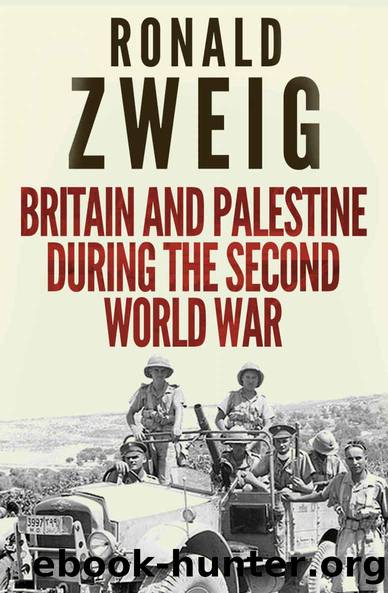Britain and Palestine During the Second World War by Zweig Ronald

Author:Zweig, Ronald [Zweig, Ronald]
Language: eng
Format: epub
Publisher: Endeavour Media
Published: 2019-02-11T21:00:00+00:00
Chapter Six â Collapse of the White Paper
The attempt to find an alternative to the White Paper through Arab federation had been abandoned by the end of 1941. The conclusions of the Middle East (Official) Committee, set out in the Report on Arab Federation of January 1942,[613] clearly stated the belief of the Foreign and Colonial Offices that any proposals concerning the future of Palestine must be based on an internal settlement between Arabs and Jews in Palestine: the imposition by the British government of grand schemes on the lines suggested by Churchill and Amery (reflecting the Weizmann-Philby plan) could not be a substitute for such a settlement.
Between 1939 and 1941 there had been a significant change in the way in which both the Eastern and the Middle East Departments believed that the White Paper would bring this about. As originally conceived, it was to have eased the way to an Arab-Jewish settlement during the steps leading to Palestineâs independence. The final stage of the White Paperâs constitutional provisions was to have been a constitutional conference (held after the growth of the Jewish National Home had been terminated by the land and immigration provisions of the White Paper) at which the Jews would be able to offer their agreement to the creation of an independent Palestine state with an Arab majority in exchange for guarantees of their minority rights, and perhaps even some limited continuation of Jewish immigration. When it had become apparent that no progress was possible during the war even on the first step of the constitutional provisions (the Heads of Department Scheme), and that a literal interpretation of the White Paper was therefore not possible, official circles adopted a âfunctionalâ approach in its place. Accordingly, it was argued that the specified provisions of the White Paper were not as important as the fact that Britain had adopted a policy which satisfied neither Arab nor Jewish demands, and that the refusal to impose any settlement other than that set out in the White Paper would force the two sides to come together to work out a settlement of their own. In retrospect it is clear that this interpretation of the White Paper was a rationalisation made necessary by the failure of that policy and the lack of any accepted alternative policy for the future of Palestine. This situation continued during 1942, when, as a result of Rommelâs advance into Egypt, more time was spent formulating plans for the evacuation of Palestine than was devoted to deliberations of future policy.
In July 1941, when Lord Moyne had first raised with the High Commissioner the possibility of attempting a solution through federation, MacMichael had responded with a proposal of his own: that the immigration and land provisions of the White Paper be retained but its constitutional provisions be abandoned; that the Jewish Agency be abolished; and that the Mandate be terminated and Palestine converted into a Crown Colony.[614] In September 1941 he repeated these proposals in a lengthy despatch, arguing that
Download
This site does not store any files on its server. We only index and link to content provided by other sites. Please contact the content providers to delete copyright contents if any and email us, we'll remove relevant links or contents immediately.
| Africa | Americas |
| Arctic & Antarctica | Asia |
| Australia & Oceania | Europe |
| Middle East | Russia |
| United States | World |
| Ancient Civilizations | Military |
| Historical Study & Educational Resources |
The Battle of Mogadishu by Matt Eversmann & Dan Schilling(754)
The Confidence Men by Margalit Fox(710)
The Spymaster of Baghdad by Margaret Coker(675)
A History of the Muslim World since 1260: The Making of a Global Community by Vernon O. Egger(672)
Jack the Ripper and the East End by Peter Ackroyd(636)
Empire of Fear: Inside the Islamic State by Andrew Hosken(623)
The Afghanistan File by Prince Turki AlFaisal Al Saud(614)
Islam At The Gates: How Christendom Defeated the Ottoman Turks by Diane Moczar(608)
Akhenaten by Dominic Montserrat(608)
The Crimean War by Winfried Baumgart(603)
The Jerusalem Diamond by Noah Gordon(595)
Beirut 2020 by Charif Majdalani(593)
The History of Jihad by Robert Spencer(587)
A Concise History of Greece (Cambridge Concise Histories) by Richard Clogg(584)
The Privatization of Israeli Security by Shir Hever(561)
Enemy in the East by Rolf-Dieter Müller(560)
Israel: Ancient Kingdom or Late Invention? by Daniel I. Block(557)
The Nine Lives of Pakistan by Declan WALSH(553)
Destroying a Nation: The Civil War in Syria by Nikolaos van Dam(549)
